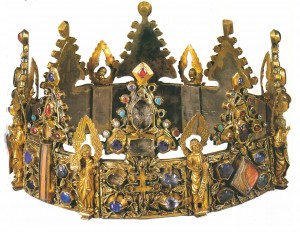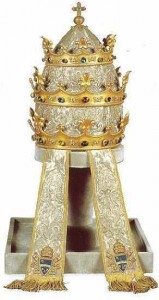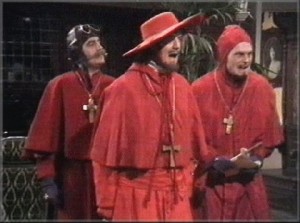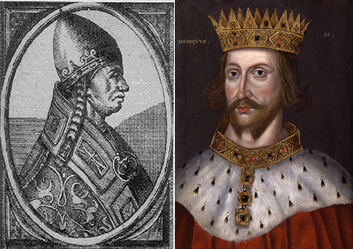As an atheist, I have often wondered how religions arise and how some, at least, last so long. Durations for the world’s major religions are impressive. The figures are: 4000 years for Hinduism, 3000 for Judaism, 2000 for Christianity and 1400 for Islam, to name the most significant. (Oh, and Jedi – 30 years: 0.7% of people on 2011 census returns cited this as their religion.)
There is now a large collection of books aiming to give an explanation as to why human beings seem to need some sort of spiritual or religious ideas in their lives. Jesse Bering’s The God Instinct, Daniel Dennett’s Breaking the Spell, A.C. Grayling’s The God Argument and Christopher Hitchens’s God Is Not Great are just a few books explaining this phenomenon, from various scientific and rational points of view: evolutionary, psychological and so forth.
In this post, I want to explore one possible contributory reason why religion, in particular Christianity in the West, has lasted so long. This is all about politics and power and the mutual support religion gives to kings and popes.
Kings and Power
Historically, the existence of kings (and they were nearly always men) depended on the use, or threat, of force to retain power. Scheming, plotting, betrayal, violence – including carrying out or commissioning acts of murder – were all part of everyday court life. History books, novels, films and plays down the centuries bear testimony to this truth. With the celebrations last year of the 800th anniversary of Magna Carta, the slow journey to modern liberal western democracy has been resisted by those with power at every step, often very violently.

Repression of the many by the few takes talent (of a sort), time, a reasonable number of close allies you can trust and, above all, money. Money is needed to bribe key individuals and groups and to pay soldiers who are prepared to fight for your cause. Many a king in history has lost power, battles, wars, influence and land through the lack of means to pay for their protection.
Popes and Politics
According to official sources, there have been 266 popes since the first, St Peter (33-67 CE). Their succession has not always been smooth: 11 were martyred, 6 deposed, 2 murdered, 3 exiled and 3 resigned (including the previous incumbent Joseph Ratzinger). There were periods in the 13th, 14th, 15th and 18th centuries when there was no pope at all. During the “Western Schism” between 1378 and 1417 there were two, and sometimes three, rival popes. At this time, incidentally, England found itself on the opposite side to France (perhaps unsurprisingly), but also to Scotland and Wales.

For the majority of its 2000 year history, there’s been rivalry, scheming, corruption, riots, popular uprisings and conflict similar to that of the kings. For the first 300 years, as leader of a small but growing cult, the pope had no real power. But from then until around the 18th or 19th century, popes and the Catholic Church played power politics big time, to greater or lesser effect. And, of course, nobody forgets the Spanish Inquisition!

A Mutual Need
Now, keeping order in an unruly kingdom has always been a problem. A king doing it all by force, i.e. an army or some form of police, is a time-consuming and expensive business. How handy it would be if there was some form of self-regulating mechanism whereby the masses behaved themselves. Aha! The pope has just the thing: an afterlife and the concepts of heaven and hell. Fortunately, these human beings really like the idea of an afterlife: it solves two problems:
- It acts as a soothing balm for the recently bereaved;
- It offers an outlet for the violent affront to the human ego when trying to imagine one’s own non-existence after death.
Popes (self-evidently) assert the existence of heaven and hell as two alternative destinations for the afterlife (plus the complicating “purification processing factory” called purgatory). Your destination depends on your ability to stick to the rules, as defined by the pope. Just throw in the presence of an all-seeing and judgmental God and – hey presto! – you have your mechanism for social control!
So, kings find popes useful as a means of helping with the social control of the masses, in a cheaper and more benign way than repression by pure force.
So, what’s in it for the popes with this deal? The Roman Catholic Church is an enormously expensive organisation to run. Having the power of the king behind you to encourage the masses to attend church, bide by its rules and drop their coins onto the collection plate is a great advantage.
There are some problems with this arrangement, however. The interests of the king do not always coincide with the interests of the pope. Kings, too, like to make rules, so whose rules must the people obey? Conflicts and power struggles abound down the ages. But, by and large, each needs the other to sustain the system in the long term.
A Symbiosis

The kings have the tax raising powers and the greater “firepower” in the use of force, if necessary. But the popes have the “trump card”: kings, too, must either end up in heaven or in hell, and so are subject to the popes’ rules. The interplay between these two “truths” produces a kind of symbiosis which helped preserve the church and monarchy for most of the last 2000 years.
So I find it unsurprising that I’m a republican as well as an atheist!